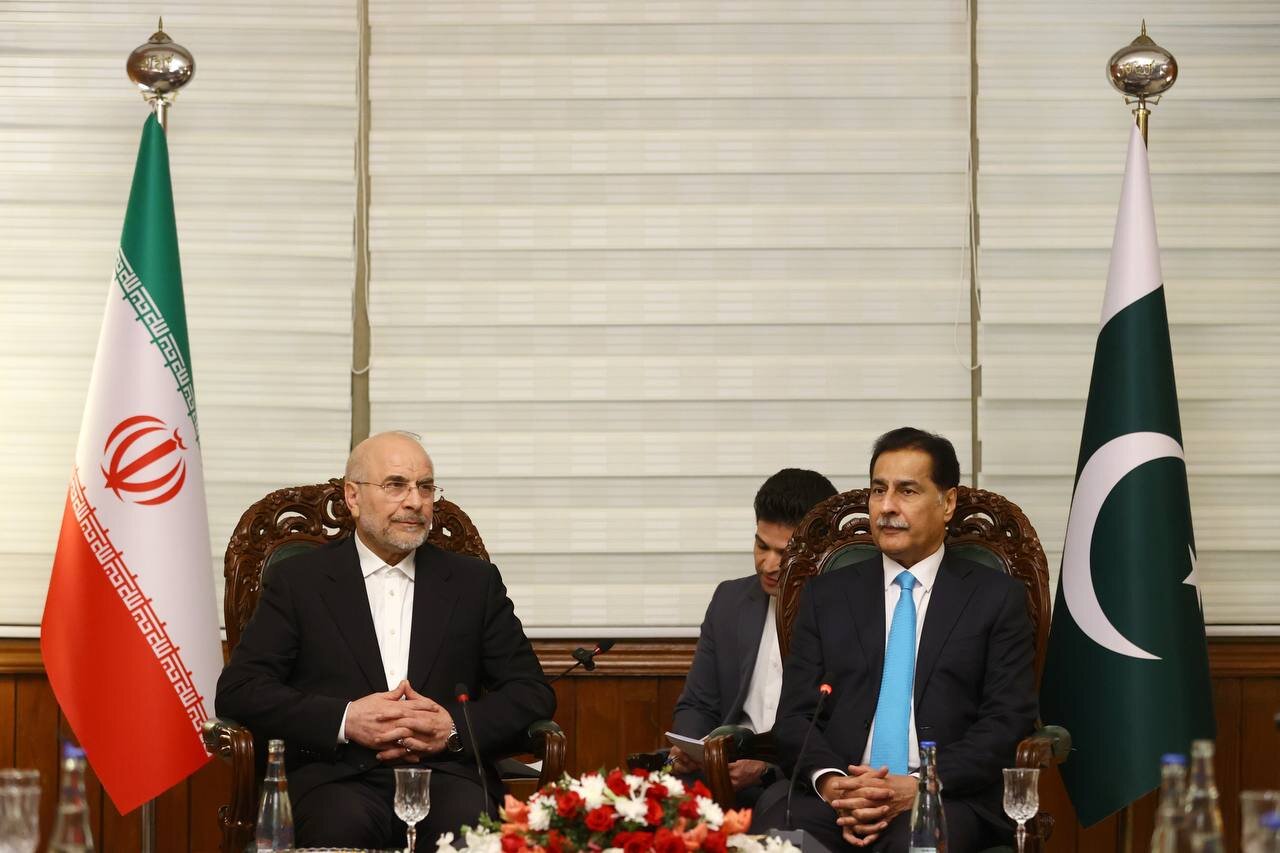Tehran seeks to deepen bilateral ties with Islamabad: Iran parliament speaker

TEHRAN – Iran’s Parliament Speaker has underlined the importance of the current level of relations between Iran and Pakistan, saying his official three-day trip seeks to “deepen bilateral ties and strengthen regional collaboration.”
Mohammad Baqer Qalibaf made the remarks as he was speaking to reporters upon arrival at Nur Khan Airbase in Islamabad on Wednesday.
He described Iran and Pakistan as two countries with “deep historical and cultural bonds” that currently enjoy broad-based relations in economic, political, and parliamentary arenas. Qalibaf added that Tehran and Islamabad are focused on expanding cooperation in trade, politics, and security, noting that implementing and finalizing previous agreements would be among the key priorities of his visit.
The top lawmaker said his meetings will emphasize the value of neighborhood diplomacy and address major regional and Islamic world issues.
During his stay, Qalibaf is scheduled to hold talks with the Speaker and members of Pakistan’s National Assembly and Senate, and meet senior political leaders, including Prime Minister Muhammad Shehbaz Sharif. His program also includes visits to Lahore and Karachi—Pakistan’s cultural and economic hubs—where he will meet with scholars, religious figures, business leaders, and members of the Iranian community.
Qalibaf is accompanied by several Iranian parliamentarians and members of the Iran-Pakistan Parliamentary Friendship Group, including Fada Hossein Maleki, Mohammad Noor Dehani, Rahmadal Bamari, Mehrdad Goodarzi, and Fazlollah Ranjbar.
Iran’s Ambassador to Islamabad, Reza Amiri-Moghaddam, and Pakistan’s National Assembly Speaker, Ayaz Sadiq, received Qalibaf and his delegation upon arrival.
Pakistan, Iran’s most populous neighbor, remains a key regional partner. The two countries’ trade volume has surpassed $3 billion, with both sides determined to raise it to $10 billion through targeted planning and the removal of trade barriers.
The visit follows remarks by Ali Larijani, Secretary of Iran’s Supreme National Security Council and senior advisor to the Leader of the Islamic Revolution Ayatollah Seyyed Ali Khamenei, who said last month that Tehran and Islamabad have the potential to elevate their cooperation to the level of a “lasting strategic partnership.”
Speaking in Tehran during a meeting with Pakistan’s Interior Minister Syed Mohsin Naqvi, Larijani highlighted the geopolitical importance of both countries and praised the recent strategic agreement between Pakistan and Saudi Arabia as “a wise and positive step in facing common threats.”
He said today’s regional environment is defined by shared challenges that demand “coordinated and comprehensive action among Muslim nations,” stressing the need to deepen collaboration in defense, security, politics, and especially economic fields.
Larijani also thanked Pakistan for its stance during the 12-day U.S.-Israeli aggression in June against Iran, calling it a sign of “shared understanding of regional realities.”
Tehran and Islamabad have both reaffirmed their commitment to developing an active diplomatic approach to promote peace and stability in the region.
In mid-October, Iranian Foreign Minister Abbas Araghchi and his Pakistani counterpart Mohammad Ishaq Dar held a phone conversation to discuss key regional and international developments. The two ministers emphasized the importance of closer coordination, intelligence sharing, and active diplomacy to strengthen bilateral and multilateral cooperation, promote regional stability, and unlock new opportunities in trade and transit.
Leave a Comment